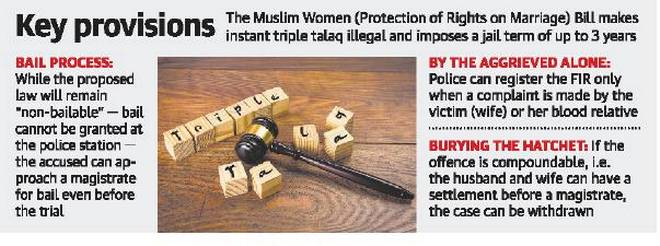Why in news?
The Union Cabinet has cleared an ordinance that makes talaq-e-biddat, or instant triple talaq, a criminal offence.
What are the key provisions?
- Instant triple talaq will now attract a maximum jail term of three years.
- The new law has some safeguards, including bail to the accused before the start of trial.
- So, instant triple talaq will continue to be a “non-bailable” offence i.e. the police cannot grant bail at the police station.
- However, the accused can approach a magistrate for bail even before trial.

Why an ordinance now?
- The Supreme Court, last year, gave a landmark verdict that made triple talaq unconstitutional.
- But despite this, the practice of triple talaq continued unabated across the country.
- Nearly 20o cases had been reported after the Supreme Court banned triple talaq in August 2017.
- Besides, the Lok Sabha has also passed the Muslim Women (Protection of Rights on Marriage) Bill, 2017.
- The Bill seeks to give statutory form to the Supreme Court ruling of 2017.
- But it is pending in the Rajya Sabha due to lack of consensus driven by some controversial provisions.
Is the ordinance route reasonable?
- Already, serious objections were raised to some provisions of the Bill passed by the Lok Sabha.
- Also, there is an ongoing debate on the desirability of criminalising instant triple talaq.
- Given this, the matter required more elaborate deliberation.
- On the other hand, due to Opposition concerns, the government proposed significant changes to dilute the provisions.
- Despite a notice for these amendments being given, the matter was not taken up in the Rajya Sabha in the last session.
- The Bill has eventually been deferred to the next session of Parliament.
- Given these, the rationale for the government to take the ordinance route remains disputable.
- Also, mere lack of consensus in the Rajya Sabha is not a good enough reason to promulgate an ordinance.
- It could even amount to subversion of the parliamentary process.
- As, the Bill has been passed in one House and the other is likely to consider it in an amended form.
What are the favourable changes though?
- Despite the dispute, the changes to be introduced through the ordinance do address some concerns with the original Bill.
- It makes the offence cognisable only if a police complaint is filed.
- [It is to be made by the woman, or one related to her by blood or marriage, against whom triple talaq has been pronounced.]
- The offence has been made compoundable i.e. the parties can settle the matter between themselves.
- It also provides that a magistrate may grant bail to the husband after hearing the wife.
- These amendments will restrict the scope for misuse by preventing third parties from setting the criminal law in motion.
- They will also leave open the possibility of the marriage continuing, by allowing bail and settlement.
- Nevertheless, the core issue remains - whether a marital wrong, essentially a civil matter, should lead to prosecutions and jail terms.
- Also, it is self-contradictory for a law to both allow a marriage to continue (as tripe talaq is invalid) and propose a jail term for the offending husband.
Source: The Hindu
